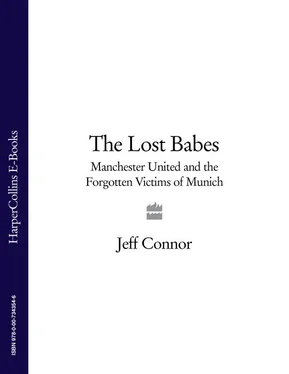‘We met as students,’ says Joy who is now remarried to James Worth, a former schoolteacher. ‘There was an intake of students and we knew one of them played football. None of us knew any names at United and City and we looked at all these chaps and thought: “Which one is it?” And we couldn’t work it out. Roger was only studying part-time and it was going to take him six years to qualify, as he only attended in the afternoons after training in the morning.
‘By the time I went to Salford in 1951 a lot of rebuilding had gone on in the town and it was becoming more affluent and a good place to live. We were able to go out more and more. At the hospital ball I went with my girlfriend who was meeting another man and he brought Roger along, so we made up a foursome. We went out and that was it. I soon finished up going to the United home matches and the local away matches, usually with Roger’s best man, John Pickles. The wives were treated as any other supporter. After the game I waited till Roger came out to the car park.’
Although many, Matt Busby and his wife Jean included, were convinced that courtship and marriage had doused many of the fires in Roger Byrne, Joy is unwilling to claim any of the credit. ‘Matt Busby always told me he was very short-tempered before he became captain, very fiery to begin with and Jean Busby said it was me that quietened him down. We were only married six months so I can’t claim any credit for that; I think it was more a matter of giving him the responsibility and him becoming responsible.’
Even after they were married, the young bride found that football was never far away. The ceremony was at St Mary’s Church, in Droylsden in June 1957, and a honeymoon was planned for Jersey. Most of the United team, as it turned out, were there and Roger played football and cricket the whole fortnight.
‘Jean and Jackie Blanchflower had been married the weekend before us and they were there on honeymoon, so it was the same for Jean,’ says Joy. ‘We met Peter McParland there [the Aston Villa player who knocked Ray Wood out in the 1957 FA Cup Final] and Jackie and Roger got on like a house on fire with him. Jean and I were not too happy, it must be said.’
Football, and Roger’s ancillary earnings that included his lively and well-read column in the Manchester Evening News , did afford the couple some luxuries. Their club house was in upmarket Urmston and they also bought a Morris Minor—‘like hen’s teeth in those days’, according to Joy—to get to and from work, the car happily tootling along at a top speed of sixty-five miles an hour and rocketing from zero to sixty in twenty-four seconds. Once, a year before Munich, it tootled in the wrong direction on an icy Wilbraham Road and careered on to a local resident’s front lawn. The occupiers, Matt and Jean Busby, woke to find the club captain and his wrecked car in their front garden, a famous piece of Manchester United folklore.
When Roger died at Munich, two days before his twentyninth birthday, Joy had been waiting at home with news of another cause for celebration—she had fallen pregnant and their first child was on the way. A boy, later christened Roger, was born in Cottage Hospital, Urmston, thirty-eight weeks after the crash.
Most of the memories of his father have come second hand from his mother and grandparents, along with old newspaper clippings and a fine and detailed biography by Iain McCartney, but Roger Jnr can also see film of the captain of the Busby Babes in action for Manchester United whenever he chooses.
Footage of that side is extremely rare, but Joy had the original film of the 1957 Cup Final defeat against Aston Villa which features as its centre-piece the Villa winger McParland’s X-certificate assault on the United goalkeeper Wood, Blanchflower’s heroics as a replacement, and the three goals. She sent it to the North West Film Archive who restored it and sent the Byrnes a tape in return.
On a modern video with freeze-frame it is possible to capture a telling moment shortly after McParland’s charge on Wood. Duncan Edwards, characteristically hitching up his shorts as he did as a prelude to any battle, is seen looking down on the prostrate Villa player, and plainly considering reprisal. It is Roger Byrne, arms spread wide, who urges calm. The rabble-rouser of the early Fifties had plainly mellowed and matured into a special leader of men.
Within twelve months, United, England, a young mother-to-be and a distraught north of England mother and father had been robbed of a man Harry Gregg is happy to describe as ‘the nicest fellow who ever walked God’s earth’.
Jessie and Bill Byrne’s grieving went on long after Munich, but according to Joy, the arrival of a grandson helped them cope.
‘Dad had great difficulty, although Mum was very strong,’ says Joy. ‘But she was bitter about fate. There was no blame to anyone, it was just that she had lost her son, her only son. Dad never did get over it. He took it extremely badly. One thing that pulled us all through was Roger, that was one thing to live for and that made a hell of a difference to all of us. We were married six months, and in all I knew him two-and-a-half years. It’s not a long time, is it? I don’t have millions of memories, but those I do have are very good.’
The bachelor Babes inevitably had more problems filling the time between training than the married men like Byrne. When the fare offered by cinemas, cafés and snooker tables of Manchester had been exhausted, one afternoon venue which earned brief popularity, particularly on a Sunday, was Ringway Airport, south of the city on the edge of the Cheshire countryside. There, a septuagenarian waitress called Amy had taken a particular shine to the young footballers, particularly Duncan Edwards. He seemed fascinated by flying and between sips of dandelion and burdock and bites of toasted crumpet ‘the big lad’, as Amy called him, would watch the planes outside take on board their passengers, taxi out to the single runway and then head upwards into the grey Manchester sky.
4 A SMALL FIELD IN GERMANY
For the majority of the Busby Babes, the first trip abroad, and their first flight, was to an international youth tournament in Zurich in May 1954. The party was led by Busby and Murphy, supported by Bert Whalley and Arthur Powell, a groundsman who was also a qualified St John’s Ambulanceman. Among the fifteen players were Edwards, Charlton, Pegg, Scanlon, Colman and Whelan. This was the nucleus of the effervescent young team who had won the FA Youth Cup for the first of five times the previous season.
Zurich was a voyage of discovery in many ways. The players had to cope with the logistics of applying for a passport for the first time, packing a suitcase to cope with the demands of a week away from home and attempt to cope with the Swiss currency. Busby had also, with a nod towards his chain-smoking staff, Powell and Murphy, warned of the penalties of attempting to bring too many packets of duty-free cigarettes back through Customs, and the perils of foreign foods.
The departure point was Ringway Airport, the forerunner of Manchester International, and named after the road close by the original site in Wythenshawe. Ringway had been opened in 1938, but it was not until 1952 that the airport began twenty-four-hour operations and by 1954 it was handling over 163,000 passengers annually. Air travel, however, remained a massive adventure outside the compass of many…and far from the magic carpet ride it is today.
The departure lounge at Ringway was adorned with vases on the window ledges and chairs with Lloydloom plastic backs and sides and, until passengers passed through the door marked Departures and stepped on to the runway tarmac, it was also exclusively all-smoking. Three civilians working in shifts manned the radar station and the method of communication between control tower and incoming and outgoing aircraft was by hand-held telephones.
Читать дальше












